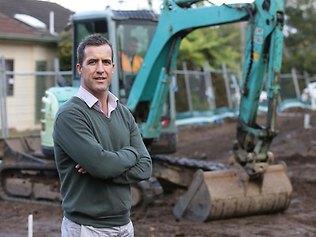When to hire your first employee
HIRING your first staff member is an exciting step for business, but it's often best to delay it for as long as possible.

Small Business
Don't miss out on the headlines from Small Business. Followed categories will be added to My News.
HIRING your first employee can be exciting, but it's often something best delayed for as long as possible.
Pitcher Partners partner David Knowles says contracting someone and paying on results can be a much better way to go.
"If you can avoid hiring an employee and pay on results in the early days, that's better," Knowles says. "Contract someone to achieve a particular outcome and pay on success."
Knowles says this avoids a lot of the administrative burden of hiring a staff member, and younger workers are used to operating that way and happy to have a number of bosses.
"You find that the overheads grow very quickly when you start putting on an extra staff member," Knowles says.
He says there is no "magic number" in terms of turnover or profit to determine when it is right to start employing - it should be part of a business plan aimed at growing a self-sustaining enterprise.
And that staff member should be someone with "complementary skills to yourself so you can do things and they do other things rather than someone who does the same as you", says Knowles.
"It's about identifying what you don't have and hiring accordingly to fill the gap."
However, hiring should be done with care because the quality of the employee could be vital, especially if the business will be looking to raise capital in the near future.
"If it's the sort of business where you have to raise capital ... then the quality of the people you surround yourself with is the most important thing," Knowles says.
"When venture capital-type people are looking to invest in start-up businesses, the quality of the management team is the No.1 focus.
"If I'm giving you my cheque book, I need to make sure you make good decisions."
Naked Business Consulting managing director John Varvarigos says often people make the mistake of expecting a new employee to deliver returns too quickly, and don't allow sufficient cash to cover the period of introduction and integration.
"Budget for six months of training where productivity is limited; then understand how that productivity will evolve from about month six to 18," Varvarigos says.
"An employee two years into a role is a lot more productive than at six months."
Varvarigos says an employee really needs to make your life easier, so it is important to understand the skill set you're looking for in that person.
"If you're a sole trader, the strengths and weaknesses of the business are linked to your personal strengths and weaknesses," he says.
"With the first employee, they should give you time to focus on your strengths while leveraging someone else to compensate for your weaknesses.
"What most people try to do at that stage is bring somebody on and get them to do tasks; whereas what they should be thinking about is ‘what's the best way for these people to be adding value to this business'."
Varvarigos says that the first employee should "free up the owner to generate new business".
Development company Plan Assist Investment Properties managing director Nick Loan says workforce management is crucial to the success of any business.
Deciding whether to wait until you "desperately need someone" or hiring to help the business grow and succeed is paramount to long-term success, he says.
"Due to practical considerations, in the past I've probably waited until we really needed that person."
However, Loan, whose business now employs 10 people, says he has recently realised that taking on a new employee is an investment on which you can expect a return.
"A founder can't grow a winning enterprise single-handedly," he says.
"I've learnt that a savvy leader must find and hire the best workers to achieve the entrepreneurial dream."
The company has operations in New South Wales and Queensland and is looking to expand into South Australia.
FINDING A NEW EMPLOYEE
* Write a position description outlining tasks and responsibilities.
* Consider how the role will evolve over time.
* Determine the applicable pay rate, bearing in mind any awards that may apply.
* Consider your immediate network for any candidates.
* As part of your advertising, highlight how you are different from other companies - you need to sell yourself.
* Consider hosting group interviews; that way you see more applicants.
* It's obvious, but have at least one interview.
* Do a reference check and in some cases a police check.
* Prepare the relevant documents - such as employment contracts etc - by seeking advice from your accountant.
* Employ people for cultural fit and capability; most technical tasks can be learnt but personality traits tend to linger.
Source: Naked Business Consulting


